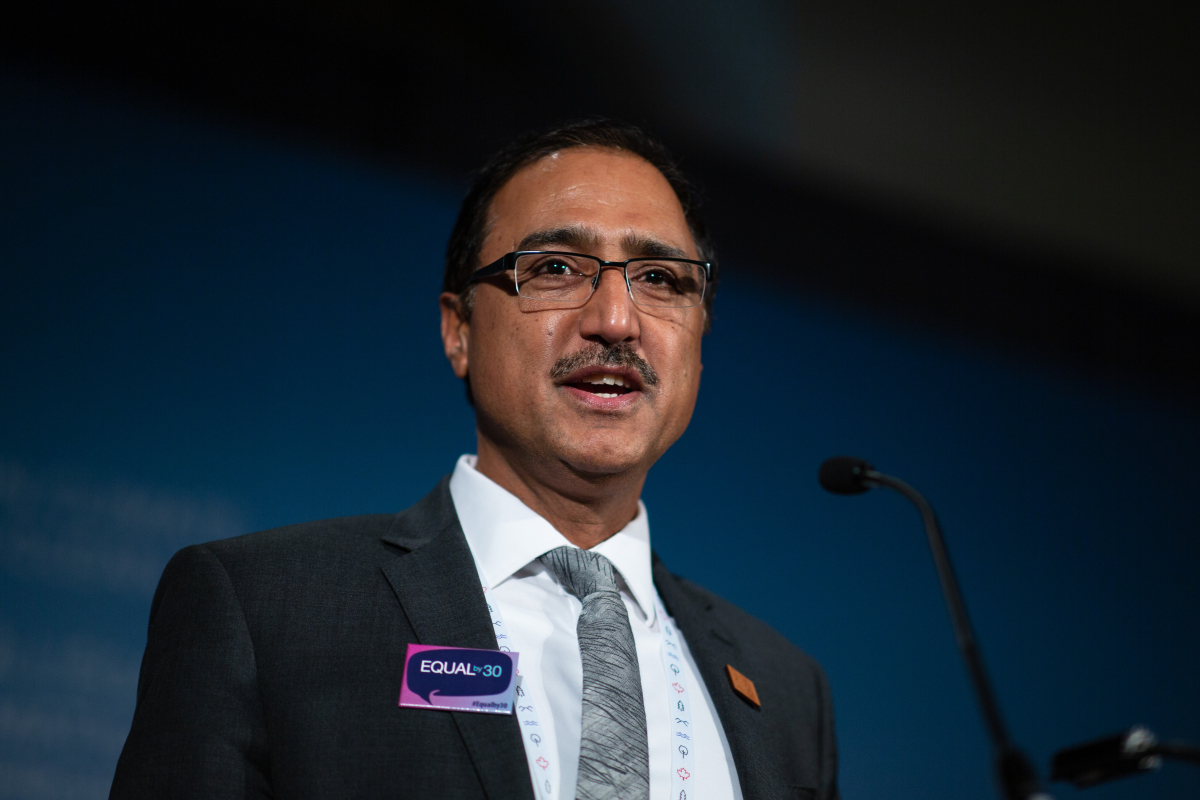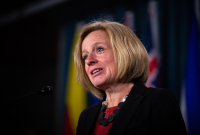Support strong Canadian climate journalism for 2025
Prime Minister Justin Trudeau should immediately appoint a “special representative,” enact an emergency law and launch a Supreme Court appeal to push the Trans Mountain expansion pipeline through to construction, says the leader of the Opposition.
Conservative Party Leader Andrew Scheer unveiled his proposed fix for the troubled project on Monday in Ottawa. He listed a series of actions he would take today if he were in Trudeau’s shoes.
Scheer’s announcement comes on the heels of new marching orders issued by the Trudeau Liberals last Friday from the G7 meetings in Halifax, and the promise of more announcements to come.
Natural Resources Minister Amarjeet Sohi said Sept. 21 that the government has given the National Energy Board (NEB) 22 weeks to reconsider its recommendations for Trans Mountain, and come up with a new report. He also said the government would appoint a "special marine technical advisor" to the NEB, among other steps.
On Monday, Scheer rejected those steps as insufficient.
“Instead of taking action, Justin Trudeau and the Liberals announced on Friday just more delays and more uncertainty,” Scheer argued at a press conference Sept. 24 inside the National Press Building in Ottawa.
“We don’t have a construction timeline yet. We have no deadline for the end of work, and no assurances for the thousands of jobs that this project represents.”
In August, a Federal Court of Appeal ruling halted construction of the Alberta-to-B.C. Trans Mountain expansion, after concluding that Trudeau’s cabinet approved the pipeline project without considering all evidence and failed in its legal duty to consult First Nations.

Scheer: People protest ‘everything all the time’
The Opposition leader said Trudeau should instead “appoint a ministerial special representative” to complete the Indigenous consultation process quickly. He said this would demonstrate the government’s “good-faith effort” to seeing those consultations through.
The government should also “enact emergency legislation,” he said, so that the NEB doesn’t need to “duplicate” the analysis of oil tanker traffic and the risks of environmental disaster — an analysis he said had been already undertaken by federal government bureaucrats.
The court ruling found that the NEB made a “critical error” when it excluded oil tanker traffic in the scope of its project. The court said that sparked a chain reaction of “unacceptable deficiencies" that tainted the NEB’s final report.
Scheer also said Trudeau should appeal that court ruling to the Supreme Court.
Finally, he said Trudeau should support Bill S-245, sponsored by independent Sen. Douglas Black, which would declare the pipeline project "to be for the general advantage of Canada." That bill has passed the Senate and is now at first reading in the House of Commons.
“We would like to see a fixed timeline,” said Scheer. “I believe this would very quickly accelerate the process.”
The Trans Mountain expansion, if completed, would triple the capacity of the existing line, shipping up to 890,000 barrels of bitumen and other petroleum products per day from Alberta’s oilpatch to a marine terminal in Metro Vancouver. The project has been the subject of relentless protests and high-profile arrests for months. Hundreds of people were arrested at the site of the west coast terminal earlier this year.
The Tsleil-Waututh Nation, Coldwater Indian Band, Squamish Nation and other Indigenous communities, environmentalists and some municipalities say the project poses an unacceptable risk to species at risk, and land and water ecosystems.
Asked what he thought of the prospect of mass arrests and heavy protests if the government pushes ahead with an accelerated implementation plan for the pipeline, Scheer dismissed such rhetoric as fear-mongering.
“I know people like to conjure up images of that kind of consultation — the people we’re concerned about are the thousands of Indigenous Canadians who want to see this project built,” he said.
“There are people protesting everything all the time. We don’t cancel everything because of that.”

Tsleil-Waututh: Dialogue will outlast 22 weeks
Last Friday, the Tsleil-Waututh Nation in B.C. welcomed the federal government’s "recognition” that marine shipping should have been included in the NEB's assessment. But it also questioned the Trudeau government's new plan to move the project forward.
In a press statement, the community said it anticipated that more review and two-way dialogue, as mandated by the court, "will take more than 22 weeks." It also said any plan for additional review "must be developed in collaboration with the Nation."
“That is only one part that we are moving forward on today, and within a very short amount of time, we will be announcing the other aspects of the plan,” Sohi said in response to questions from National Observer about the Tsleil-Waututh’s assertion that 22 weeks is not enough.
“There’s no relationship that's more important to our government than the relationship with Indigenous peoples,” he said. “We will, as we roll out the plan in the coming days, be able to be in a better position to (explain) how we’re going to proceed.”
The minister also said there were “provisions and opportunities” in the new NEB review for Indigenous peoples to be involved in “commenting on the scope of the review.”
On Monday, asked about how he can be confident that consultations can be done expeditiously, Scheer said “the duty to consult is very clear. It means concerns have to be addressed, and addressing those concerns can take a variety of options.”
“When the process is properly executed, and the science is clear and the evidence is clear, we have to live in a country” where big projects can get built, he said.






Comments
Yes, Scheer, the science and the evidence is clear, along with the Federal Court of Appeal affirmed First Nations' constitutional rights, that big green energy projects, not pipe dreams, can be built.
Interesting comments by Scheer, more words at this point. The same goes for the Liberals, it is a wait and see game.
A question for you Carl Meyer, (Do our politicians have a real grasp of the Indigenous peoples position on their relationship with Canada's Government Members of Parliament, Bureaucrat's and Federal Police Forces?)
The reason for this question stems from the two books I have read- "Unsettling Canada A National Wake-up Call", by Arthur Manuel, Grand Chief Ronald M Derrickson; "The Reconciliation Manifesto, Recovering the Land Rebuilding the Economy" by Arthur Manuel, Grand Chief Ronald Derrickson. Both author's are members of the Indigenous People in Canada.
The two books are an eye opener. If you have not read same, suggest you do.
They provide a wealth of information, take time to read same.
John Atkinson
I fully agree with John Atkinson. I have read the two Arthur Manual books. I hope Carl Meyer and many other politicians, and Canadians, read these eye openers.
Like so many people, the PC party has a way of ignoring everything that does not immediately shore up the failing golden goose the world calls the Tar Sands. It is as if the pipelines are merely benign props to the devastation of the dilbit being torn, at great expense, and environmental destruction, from Alberta's shale formation. No PC politician will touch with a barge pole, the Tar Sands liabiities, the already shrinking workforce - replaced by self driving trucks and other robotics. No PC proponent will dicsuss the actuality of contracts for the dilbit from consumers around the world. No PC apologists will address any of the actual land rights of the indigenous nations. No PC expert has come along with the EUREKA moment to solve the ongoing problems of dilbit contaminations that have already ocurred, let alone those that are sure to happen with an expanded pipeline capacity. Certainly none of them will even whisper the increased CO2 and Methane load the Tar Sands will produce. Hammering away at the tired old lies and misleading claims is all they can do. How futile. How pathetic.
It's kind of troubling that basically what he WANTS to say isn't "people protest things all the time, who cares?" but rather "Courts make inconvenient rulings all the time, who cares?" which seems to be more and more a common Conservative theme (cf. Doug Ford).
But aside from that, why does he think any of this stuff would work? He really doesn't get it. Like, he wants to appoint a special individual, explicitly to get the consultations over with quickly so they can move forward and do exactly what they were planning to do. In short, he's saying up front that he wants someone to do some quickie fake "consultation" so they can get on with it. That's exactly what got the previous process struck down, duh.
So the question is, is Scheer a complete moron or is he a demagogue taking the Canadian people for morons? Inflammatory lies or utter stupidity, it has to be one. Well, unless he means to actually do it and then trample the courts when they call out his fake consultation. Now what right-wing ideology is into trampling courts and the rule of law? Whichever way you slice it, his reasons for saying this nonsense can't be good.
Can't he be both? :)